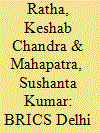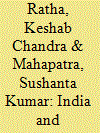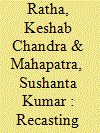|
|
|
Sort Order |
|
|
|
Items / Page
|
|
|
|
|
|
|
| Srl | Item |
| 1 |
ID:
125265


|
|
|
|
|
| Publication |
2013.
|
| Summary/Abstract |
BRICS (Brazil, Russia, India, China and South Africa) has developed into a vibrant co-operation mechanism. The New Delhi declaration of fourth BRICS summit reflects the evolution of a common vision and maturing relationship among member states in the current international system. The co-operation among BRICS nations is a reflection on the development of international situation as well as the desire and choice of emerging economies. The establishment of BRICS Development Bank is a crucial announcement for serving the development needs and aspirations of the emerging and developing world.
|
|
|
|
|
|
|
|
|
|
|
|
|
|
|
|
| 2 |
ID:
125231


|
|
|
|
|
| Publication |
2013.
|
| Summary/Abstract |
India and Myanmar have been enjoying the mutual contact in the field of trade, commerce, religion, law, political philosophy and culture. The British Raj was making its control over two lands for years together. Myanmar got its independence and India was also freed from the shackles of British rule on 15th Aug, 1947. Nehru and U Nu developed a friendship that created the foundation of good Indo- Burmese relation. When India supported pro-democracy movement and criticized the ruling military Junta in Myanmar, the relation between two nations came down. However, in 1990s, the relation between two countries restored again. They are co-operating in all fields including countering insurgency on the border, checking narcotics smuggling across the border, sharing intelligence on a real-time basis, promoting trade and investment. There are four important factors such as cultural, political, economic and security that involve relations with Myanmar.
|
|
|
|
|
|
|
|
|
|
|
|
|
|
|
|
| 3 |
ID:
139295


|
|
|
|
|
| Summary/Abstract |
Xi Jinping’s new reformist approach of 2013 is a close reflection of Deng Xiaoping’s prescription of 1978. The Chinese political leadership is tightening its political grip and loosening economic control. China has a tradition of leadership being an economic rightist and a political leftist at the same time. The thesis of Xi Jinping is based upon the conception that one should not use post-reform history to negate the pre-reform years. It also says that one should not ‘exaggerate’ Mao Zedong’s mistakes but should acknowledge his contributions. China’s president Xi Jinping has assumed the mantle of Deng Xiaoping, who was responsible both for huge economic changes and the Tiananmen Square massacre. The third plenum communiqué epitomises Mao’s thought, based upon socialism, a market economy, the one party system, and dominance of state-owned enterprises. Xi’s openly pro-Maoist tone, his reinforcement of Mao-era slogans and practices such as the ‘rectification’ anti-graft campaign and a ‘mass line’ ideology campaign, as well as the denunciation of Western democratic ideals and the serious attack on government critics, have created fear and anxiety among many liberals
|
|
|
|
|
|
|
|
|
|
|
|
|
|
|
|
| 4 |
ID:
141911


|
|
|
|
|
| Summary/Abstract |
Sino-Indian relations were governed by concerns about an unsound bilateral bonhomie, internal as well as external strategic and political considerations, and in addition, national interests and priorities not necessarily oriented towards pacifying the bilateral relations. The change in leadership presented a golden opportunity for refiguring the India–China relationship in terms of mutual economic gains, crafting a durable framework to deal with their border dispute, marking the culmination of a great deal of proactive diplomacy and planning by both governments in a short period of time and thereby giving a new dynamism to the bilateral relationship. The sustained progress in the multifarious strategic issues such as trade deficit, border disputes and investment has eventually built trust between the two nations. This article explores how both nations have continued their efforts with a series of important cooperation initiatives in the areas of economy, culture, trade and borders to achieve peaceful cooperation and inclusive development for the benefit of two peoples in particular and in the interest of peace and stability in the world in general.
|
|
|
|
|
|
|
|
|
|
|
|
|
|
|
|
| 5 |
ID:
166066


|
|
|
|
|
|
|
|